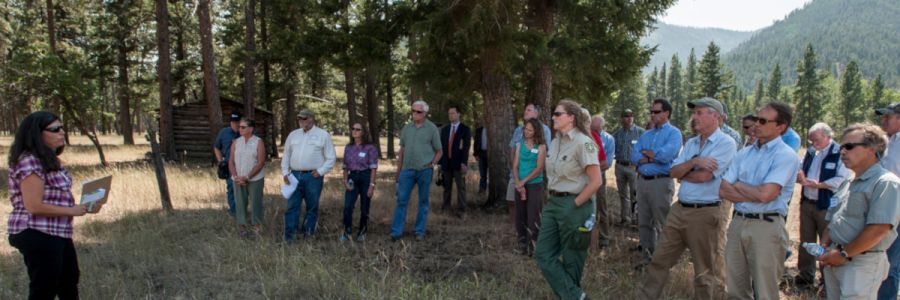To equip leaders with the knowledge, skills, and abilities needed to advance progress on complex, adaptive challenges – and opportunities – facing people and nature, the Center founded and chairs a university-wide graduate certificate program on Natural Resources Conflict Resolution.
This is the only graduate-level program in the nation specifically designed to provide students with a working knowledge of the theory and practice of collaboration and conflict resolution as applied to natural resources and environmental issues.
Students and faculty from more than 15 different disciplines regularly participate in courses and practicum projects. Students also have the opportunity to connect to the Center’s projects and partners throughout the program, practicing essential collaborative leadership skills while fostering relationships with practitioners, agency staff, scholars, and communities across Montana, the region, and the globe.
The program is co-sponsored by the University of Montana Graduate School, W.A. Franke College of Forestry and Conservation, Alexander III School of Law, and College of Humanities and Sciences. It is administered by the W.A. Franke College of Forestry and Conservation and directed by the Center for Natural Resources and Environmental Policy.
For inquiries, contact Travis Anklam at travis.anklam@umt.edu.
Program Requirements
Three core courses are offered for the Certificate, including:
- Natural Resources Conflict Resolution – 3 Credits, Fall Semester
- Collaborative Skills for Natural Resource Leaders – 3 Credits, Spring Semester
- Practicum in Collaborative Conservation – 3 Credits, Any Semester
We also require six elective credits from two areas of coursework.
- A list of potential courses to fulfill elective credits can be found in the graduate school’s course catalog.
More information on the program and its requirements can be found in the program handbook:
Admissions & Student Guidelines
Current or admitted graduate students at the University of Montana can apply to the program by submitting a Letter of Intent to the program co-chairs that includes:
- A statement of interest outlining how the NRCR Program contributes to the student’s academic and professional goals;
- A proposed list of courses —including both required and elective courses— to meet the required number of credits for the program as well as other courses for your graduate degree. Elective courses that are not listed on the suggested list of elective courses must be approved by the NRCR Program co-chairs; and a
- Current Professional Resume
- See an example of a Letter of Intent
Prospective students seeking to complete the program as a stand-alone graduate certificate can apply to the program through the graduate school. Applications must include the following materials:
- A Letter of Intent including:
- A statement of interest outlining how the NRCR Program contributes to the student’s academic and professional goals; and
- A proposed list of courses —including both required and elective courses— to meet the required number of credits for the program. Elective courses that are not listed on the suggested list of elective courses must be approved by the NRCR Program co-chairs.
- See an example of a Letter of Intent
- One Letter of Reference from someone who can speak to your professional and/or academic ability and potential.
- Current Professional Resume.
- Official Transcripts from completed undergraduate and (if applicable) graduate studies.
Upon admission to the program, students must complete the following to earn the NRCR graduate certificate:
- Meet with the program co-chairs to review learning goals, curriculum requirements, and practicum-related interests.
- Successfully complete the required and elective courses.
- Prepare a final self-evaluation of knowledge, skills, and abilities, and meet with the program co-chairs for an exit interview.
Upon completing the NRCR Program, students are encouraged to participate in the NRCR Program alumni network.
